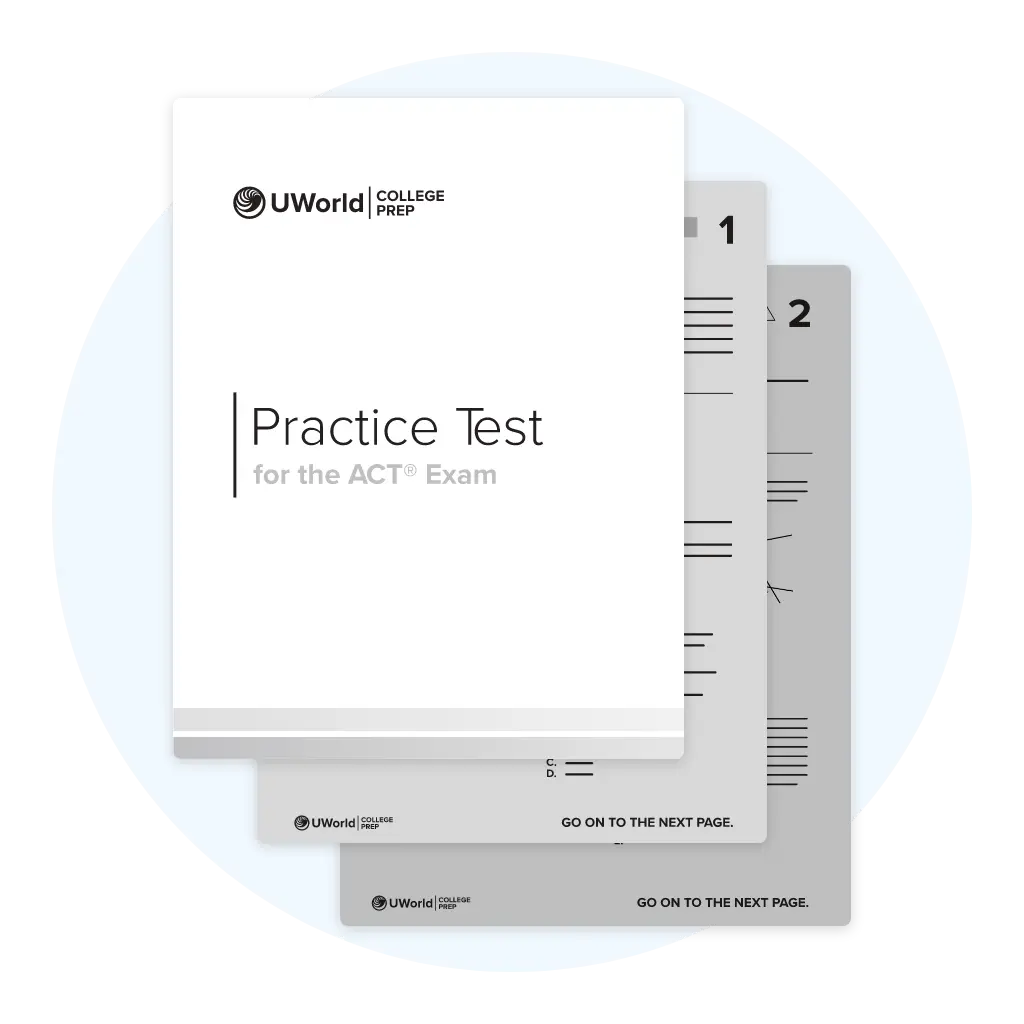Free ACT® Practice Test
Download Full-Length Exam With Answers
Real exam questions. Real results. Start with a free ACT® practice test PDF and get one step closer to your target score.

Why Try UWorld’s Free ACT Practice Test?
Our expert-created full-length ACT® practice test mirrors the real exam, with in-depth answer explanations and real-time performance insights. It’s free, printable, and will help boost your score.
Experience our Expertise
Practice exam-like questions with in-depth answer explanations written by our ACT specialists.
Take the “Real Exam”
Build test-day confidence with a full-length format that mirrors the exam’s timing and structure.
Know Where You Stand
Review your answers with real-time performance insights to turn weaknesses into wins.
Benefits of Taking Full-Length ACT Practice Tests
Taking full-length ACT practice tests is one of the most effective ways to boost your score. Here’s why it works:
The ACT is a marathon, not a sprint. Practice staying focused for hours with a test that matches the full exam length and format.
Timing is 1 of the biggest ACT challenges. Full-length practice helps you learn how long to spend on each question — and when to move on.
Familiarity builds confidence. Practice under exam-like conditions to feel calm, prepared, and in control on test day.
From section order to question types, knowing what’s coming means you’ll waste less time figuring things out on test day.
Varying question difficulty helps you spot your weak points fast — so you can focus where it counts most.
Your practice score is a strong signal of how you’ll do on the real thing. Use it to fine-tune your prep strategy.
Get Free ACT Questions Every Week
Get ACT exam-ready with weekly exam-like questions sent to your inbox.Access 2,600+ ACT Practice Questions
Master every section of the ACT with exam-like questions and in-depth answer explanations.How to Make ACT Practice Tests Work for You
Practice tests are tools designed to help you improve. You’ll improve your test-taking skills and subject knowledge by focusing on three key aspects to get the most out of ACT practice tests.
Alternate practice tests with study
Begin with an assessment practice test to identify areas for improvement. Focus on those areas during dedicated study sessions before attempting a second practice test. Incorporating monthly practice tests alongside weekly study sessions will enhance your test prep.
Analyze the areas ripe for enhancement
A solid test preparation strategy embraces the opportunity to identify and improve upon areas of difficulty. By focusing on these challenges, you'll build a comprehensive knowledge base and acquire the test-taking skills essential for excelling in the ACT.
Take both timed and untimed practice tests
While timed practice tests offer you a realistic testing environment to improve your time-management skills, untimed tests are designed to evaluate your knowledge on specific sections and subject areas of the ACT. Taking both will improve both your knowledge and skills.
Frequently Asked Questions (FAQs)
Is the free practice test printable/downloadable?
Yes. Our free ACT practice test is available as a downloadable and printable PDF — with an answer key and answer explanations included.
How long is UWorld’s full-length ACT practice test?
It matches the official test length — covering English, Math, Reading, and Science. Expect about 3 hours of timed testing, plus breaks.
Where can I find the answers for UWorld’s free ACT sample test?
Your test download includes a complete answer key and detailed explanations. No extra steps are required.
Where can I find more free ACT sample tests?
You can unlock more sample questions and full practice options by starting a free trial. We also offer regular ACT prep tips and downloads on our blog.
Do you have full-length SAT practice tests?
Yes. Visit our SAT prep page to access practice tests built with the same expert approach.
Is this free ACT practice test also available in an online or interactive digital format?
No. The free ACT practice test is currently a downloadable PDF. For digital, interactive practice with smart tracking, try our 7-day ACT QBank free trial.
How does the difficulty level and question style of this free practice test compare to the official ACT exam?
Our questions match the official ACT’s tone, structure, and challenge level, so test day feels familiar.
What are the recommended next steps after taking this free practice test and reviewing my answers?
Use your results to identify focus areas. Then, dive into targeted practice with our QBank or retake a full test to measure progress. Explore our guide on How to Study for ACT for expert tips.